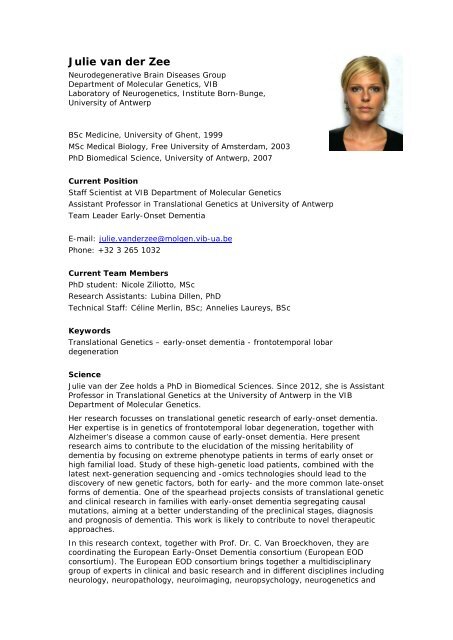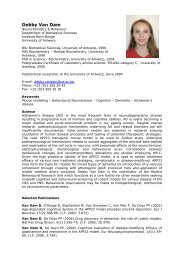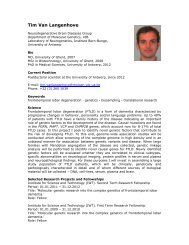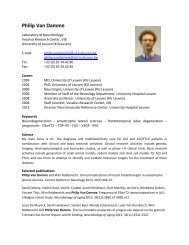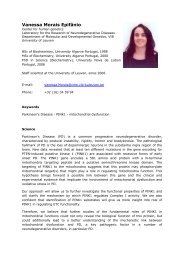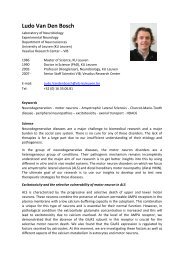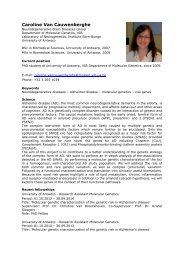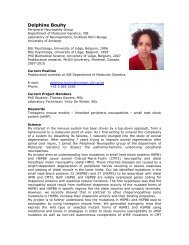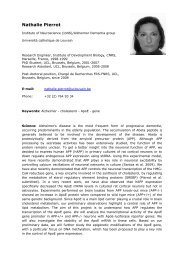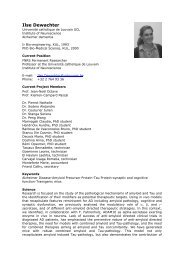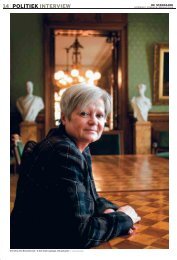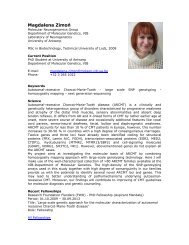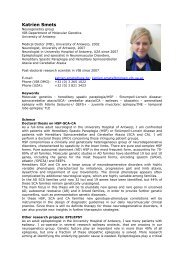Julie van der Zee
Julie van der Zee - Department of Molecular Genetics
Julie van der Zee - Department of Molecular Genetics
- No tags were found...
Create successful ePaper yourself
Turn your PDF publications into a flip-book with our unique Google optimized e-Paper software.
<strong>Julie</strong> <strong>van</strong> <strong>der</strong> <strong>Zee</strong><br />
Neurodegenerative Brain Diseases Group<br />
Department of Molecular Genetics, VIB<br />
Laboratory of Neurogenetics, Institute Born-Bunge,<br />
University of Antwerp<br />
BSc Medicine, University of Ghent, 1999<br />
MSc Medical Biology, Free University of Amsterdam, 2003<br />
PhD Biomedical Science, University of Antwerp, 2007<br />
Current Position<br />
Staff Scientist at VIB Department of Molecular Genetics<br />
Assistant Professor in Translational Genetics at University of Antwerp<br />
Team Lea<strong>der</strong> Early-Onset Dementia<br />
E-mail: julie.<strong>van</strong><strong>der</strong>zee@molgen.vib-ua.be<br />
Phone: +32 3 265 1032<br />
Current Team Members<br />
PhD student: Nicole Ziliotto, MSc<br />
Research Assistants: Lubina Dillen, PhD<br />
Technical Staff: Céline Merlin, BSc; Annelies Laureys, BSc<br />
Keywords<br />
Translational Genetics – early-onset dementia - frontotemporal lobar<br />
degeneration<br />
Science<br />
<strong>Julie</strong> <strong>van</strong> <strong>der</strong> <strong>Zee</strong> holds a PhD in Biomedical Sciences. Since 2012, she is Assistant<br />
Professor in Translational Genetics at the University of Antwerp in the VIB<br />
Department of Molecular Genetics.<br />
Her research focusses on translational genetic research of early-onset dementia.<br />
Her expertise is in genetics of frontotemporal lobar degeneration, together with<br />
Alzheimer’s disease a common cause of early-onset dementia. Here present<br />
research aims to contribute to the elucidation of the missing heritability of<br />
dementia by focusing on extreme phenotype patients in terms of early onset or<br />
high familial load. Study of these high-genetic load patients, combined with the<br />
latest next-generation sequencing and -omics technologies should lead to the<br />
discovery of new genetic factors, both for early- and the more common late-onset<br />
forms of dementia. One of the spearhead projects consists of translational genetic<br />
and clinical research in families with early-onset dementia segregating causal<br />
mutations, aiming at a better un<strong>der</strong>standing of the preclinical stages, diagnosis<br />
and prognosis of dementia. This work is likely to contribute to novel therapeutic<br />
approaches.<br />
In this research context, together with Prof. Dr. C. Van Broeckhoven, they are<br />
coordinating the European Early-Onset Dementia consortium (European EOD<br />
consortium). The European EOD consortium brings together a multidisciplinary<br />
group of experts in clinical and basic research and in different disciplines including<br />
neurology, neuropathology, neuroimaging, neuropsychology, neurogenetics and
neurobiology. The consortium currently holds 50 dementia expertise centers from<br />
16 EU-countries and is further setting up new collaborations with national and<br />
international partners.<br />
Selected Research Projects and Fellowships<br />
Foundation Alzheimer Research (SAO-FRA). Pilot Award<br />
Period: , 01.01.2013 – 31.12.2014<br />
Title: ‘High-profile translational genetic research on early-onset dementia’<br />
Role: PI<br />
Research Foundation Flan<strong>der</strong>s (FWO). Research Fellowship<br />
Period: 01.10.2011 – 30.09.2014<br />
Title: ‘Molecular genetics and biomarker research of frontotemporal lobar<br />
degeneration supported by robust biosampling and biobanking strategies’<br />
Role: Fellow<br />
Research Foundation Flan<strong>der</strong>s (FWO). Investigator Initiated Grant<br />
Period: 01.01.2011 – 31.12.2013<br />
Title: ‘In depth investigation of TMEM106B as first common risk factor for FTLD in<br />
a Flan<strong>der</strong>s-Belgian population of clinically diagnosed patients’<br />
Role: PI<br />
International Alzheimer Research Foundation (SAO/FRMA). Pilot Award<br />
Period: 01.01.2011 – 31.12.2012<br />
Title: ‘Follow-up of genome-wide association studies in a powerful study<br />
population of Belgium FTLD patients’<br />
Role: PI<br />
Research Foundation Flan<strong>der</strong>s (FWO). Research Fellowship<br />
Period: 01.10.2008 – 30.09.2011<br />
Title: ‘Genetic risk for frontotemporal lobar degeneration: A genome-wide<br />
approach’<br />
Role: Fellow<br />
All Projects and Fellowships<br />
Selected Publications<br />
<strong>van</strong> <strong>der</strong> <strong>Zee</strong>,J., Gijselinck,I., Dillen,L., Van Langenhove,T., Theuns,J.,<br />
Engelborghs,S., Philtjens,S., Vandenbulcke,M., Sleegers,K., Sieben,A.,<br />
Bäumer,V., Maes,G., Corsmit,E., Borroni,B., Pado<strong>van</strong>i,A., Archetti,S.,<br />
Perneczky,R., Diehl-Schmid,J., De Mendonca,A., Miltenberger-Miltenyi,G.,<br />
Pereira,S., Pimentel,J., Nacmias,B., Bagnoli,S., Sorbi,S., Graff,C., Chiang,H.-H.,<br />
Westerlund,M., Sanchez-Valle,R., Llado,A., Gelpi,E., Santana,I., Rosario<br />
Almeida,M., Santiago,B., Frisoni,G., Zanetti,O., Bonvicini,C., Synofzik,M.,<br />
Maetzler,W., Müller vom Hagen,J., Schöls,L., Heneka,M.T., Jessen,F., Matej,R.,<br />
Parobkova,E., Kovacs,G.G., Ströbel,T., Sarafov,S., Tournev,I., Jordanova,A.,<br />
Danek,A., Arzberger,T., Fabrizi,G.-M., Testi,S., Salmon,E., Santens,P., Martin,J-<br />
J., Cras,P., Vandenberghe,R., De Deyn,P.P., Cruts,M., Van Broeckhoven,C., on<br />
behalf of the European Early-Onset Dementia (EOD) Consortium,: A Pan-<br />
European study of the C9orf72 repeat associated with FTLD: geographic<br />
prevalence, genomic instability and intermediate repeats. Human Mutation 34(2):<br />
363-373 (2013) (I.F.: 5.213)<br />
Gijselinck,I., Van Langenhove,T., <strong>van</strong> <strong>der</strong> <strong>Zee</strong>,J., Sleegers,K., Philtjens,S.,<br />
Kleinberger,G., Janssens,J., Bettens,K., Van Cauwenberghe,C., Pereson,S.,<br />
Engelborghs,S., Sieben,A., De Jonghe,P., Vandenberghe,R., Santens,P., De<br />
Bleecker,J., Maes,G., Bäumer,V., Dillen,L., Joris,G., Cuijt,I., Corsmit,E., Elinck,E.,
Van Dongen,J., Vermeulen,S., Van den Broeck,M., Vaerenberg,C.,<br />
Mattheijssens,M., Peeters,K., Robberecht,W., Cras,P., Martin,J-J., De Deyn,P.,<br />
Cruts,M., Van Broeckhoven,C.: A C9orf72 promoter repeat expansion in a<br />
Flan<strong>der</strong>s-Belgian cohort with disor<strong>der</strong>s of the frontotemporal lobar degenerationamyotrophic<br />
lateral sclerosis spectrum: a gene identification study. Lancet<br />
Neurology 11(1): 54-65 (2012) (I.F.: 21.659) (PMID: 22154785)<br />
<strong>van</strong> <strong>der</strong> <strong>Zee</strong>,J., Van Langenhove,T., Kleinberger,G., Sleegers,K., Engelborghs,S.,<br />
Vandenberghe,R., Santens,P., Van den Broeck,M., Joris,G., Brys,J.,<br />
Mattheijssens,M., Peeters,K., Cras,P., De Deyn,P., Cruts,M., Van Broeckhoven,C.:<br />
TMEM106B is associated with frontotemporal lobar degeneration in a clinically<br />
diagnosed patient cohort. Brain 134(Pt 3):808-15 (2011) (I.F.:9.490) (PMID:<br />
21354975)<br />
Van Deerlin,V.M., Sleiman,P.M.A., Martinez-Lage,M., Chen-Plotkin,A., Wang,L-S,<br />
Schellenberg,G., Hakonarson,H., Trojanowski,J.Q., Lee,V.M-Y., Graff-<br />
Radford,N.R., Dickson,D., Rademakers,R., Grossman,M., Arnold,S.E.,<br />
Mann,D.M.A., Pickering-Brown,Stuart M., Heutink,P., Van Swieten,J., Murrell,J.R.,<br />
Ghetti,B., Spina,S., Hodges,J., Spillanti,M., Gilman,S., Lieberman,A.P., Kaye,J.A.,<br />
Woltjer,R.L., Bigio,E.H., Mesulam,M., al-Sarraj,S., Troakes,C., Rosenberg,R.N.,<br />
White,C.L., Ferrer,I., lladó,A., Neumann,M., Kretzschmar,H.A., Hulette,C., Welsh-<br />
Bohmer,K.A., Miller,B.L., Alzualde,A., Lopez de Munain,A., McKee,A.C.,<br />
Gearing,M., Levey,A.I., Lashley,T., Revesz,T., Mackenzie,I.R., Feldman,H.,<br />
Hamilton,R.L., Dekosky,S.T., <strong>van</strong> <strong>der</strong> <strong>Zee</strong>,J., Kumar-Singh,S., Van<br />
Broeckhoven,C., Mayeux,R., Vonsattel,J-P.G., Price,D.L., Troncoso,J., Kril,J.,<br />
Kwok,J.B.J., Halliday,G., Bird,T., Ince,P.G., Cairns,N.J., McLean,C.A., Ellis,W.G.,<br />
Freeman,S.M., Frosch,M.P., Growdon,J., Perl,D.P., Sano,M., Bennett,D.A.,<br />
Schnei<strong>der</strong>,J.A., Beach,T.G., Reiman,E.M., Cummings,J., Vinters,H.V., Chui,H.,<br />
Miller,C.A., Alafuzoff,I., Seilhean,D., Galasko,D., Masliah,E., Cotman,C.W.,<br />
Tuñon,M.T., Munoz,D.G., Carroll,S.L., Marson,D., Bogdanovic,N., Rie<strong>der</strong>er,P.:<br />
Common variants at 7p21 are associated with frontotemporal lobar degeneration<br />
with TDP-43 inclusions. Nature Genetics 42(3): 234-239 (2010) (I.F.: 30.259)<br />
(PMID: 20154673)<br />
<strong>van</strong> <strong>der</strong> <strong>Zee</strong>,J., Urwin,H., Engelborghs,S., Bruyland,M., Vandenberghe,R.,<br />
Dermaut,B., De Pooter,T., Peeters,K., Santens,P., De Deyn,P.P., Cruts,M.,<br />
Fisher,E.M.C., Collinge,J., Isaacs,A., Van Broeckhoven,C.: CHMP2B C-truncating<br />
mutations in frontotemporal lobar degeneration are associated with an aberrant<br />
endosomal phenotype in vitro. Human Molecular Genetics 17(2):313-322<br />
(2008) (I.F.: 7.249) (PMID: 17956895)<br />
Cruts,M., Gijselinck,I., <strong>van</strong> <strong>der</strong> <strong>Zee</strong>,J., Engelborghs,S., Wils,H., Pirici,D.,<br />
Rademakers,R., Vandenberghe,R., Dermaut,B., Martin,J-J., <strong>van</strong> Duijn,C.,<br />
Peeters,K., Sciot,R., Santens,P., De Pooter,T., Mattheijssens,M., Van den<br />
Broeck,M., Cuijt,I., Vennekens,K., De Deyn,P., Kumar-Singh,S., Van<br />
Broeckhoven,C.: Null mutations in progranulin cause ubiquitine-positive<br />
frontotemporal dementia linked to chromosome 17q21. Nature 442: 920-924<br />
(2006) (I.F.: 26.681) (PMID: 16862115)<br />
All Publications


